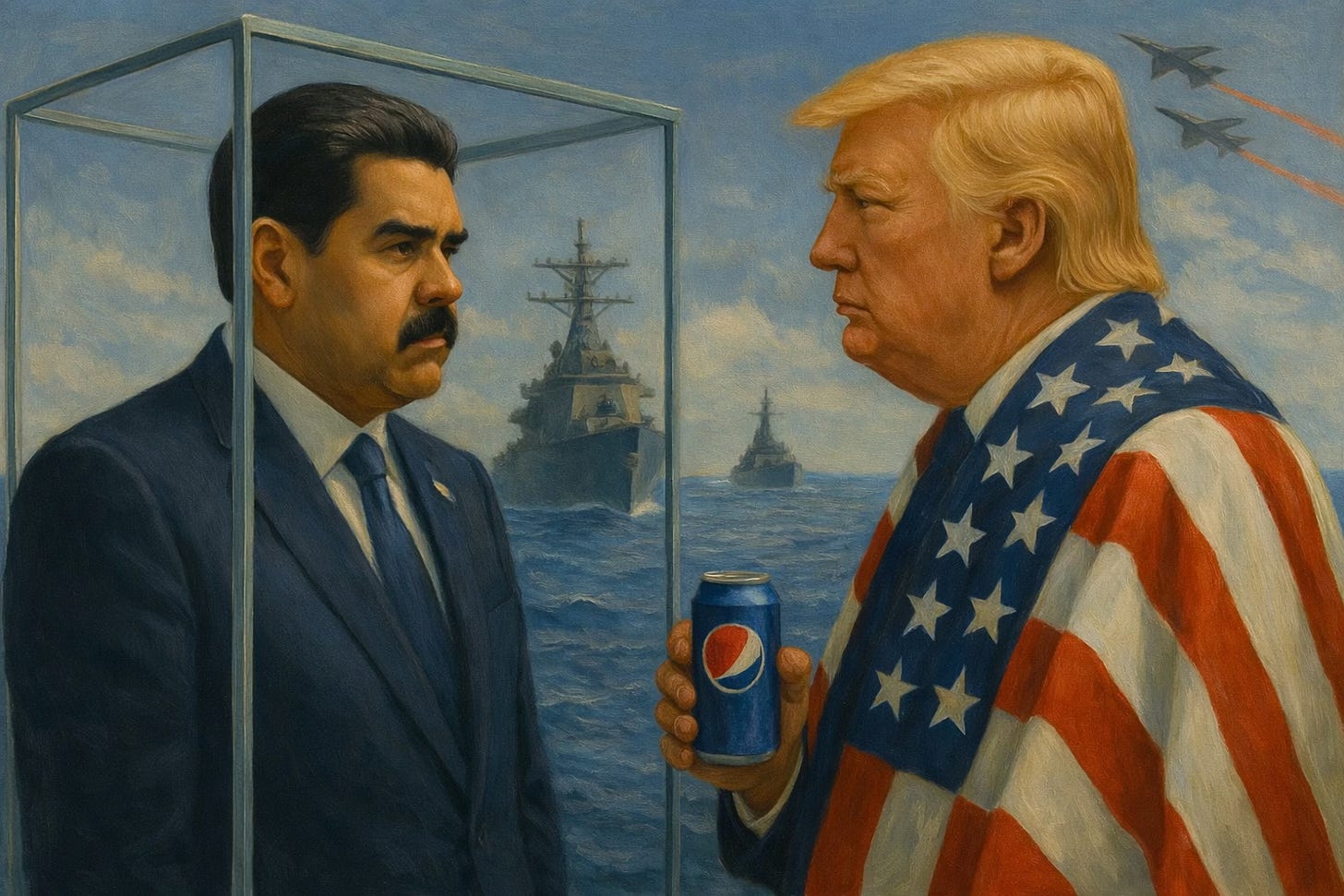Weaponizing Counterterrorism
A Venezuela strategy that swaps de-escalation for oil and political wins while preserving legal cover for full-scale intervention.
Trump just casually mentioned the administration may be having some discussions with Nicolás Maduro. Don’t buy it. This isn’t diplomacy. It’s a loaded gun aimed at Caracas with one exit door barely cracked open.
The official story is a mess of contradictions: brutal military coercion happening at the exact same time as vague hints about high-level talks. This dual-track thing is a sharp turn from the old maximum pressure playbook, which spent years trying to starve Maduro out with sanctions and got nowhere. The goal now? Squeeze him hard enough that he gives up what economic pressure alone couldn’t touch.
Trump confirmed Maduro would like to talk, which is awkward given that Washington has spent years calling him an illegitimate drug lord who runs a narco-state.
But calling it a diplomatic off-ramp is generous. When asked directly about sending US troops into Venezuela, Trump wouldn’t rule it out: I don’t rule out anything, we just have to take care of Venezuela.
And the hardware backs it up. The USS Gerald R. Ford, the biggest aircraft carrier on the planet, is sitting in the Caribbean right now with about 15,000 troops. That is way more firepower than you need to intercept drug boats. Plans to hit Maduro’s military command have reportedly already been drawn up. This looks a lot more like prep for regime destabilization than counter-narcotics work.
The State Department is officially designating the Cartel de los Soles as a Foreign Terrorist Organization starting November 24. The cartel is allegedly a drug trafficking operation run by Maduro and senior Venezuelan officials. Once that FTO label goes live, the US can legally target those people as terrorists, not government officials. It’s a bureaucratic workaround that lets Washington avoid saying regime change out loud while doing exactly that.
The Treasury already calls it a terrorist group led by Maduro himself. That classification expands what the military can hit. Suddenly you’re not talking about interdicting drugs anymore. You’re talking about decapitation strikes under the cover of counter-terrorism.
And none of this is theoretical. It’s already happening.
Since early September, US forces have launched at least 21 strikes on small boats in the Caribbean and eastern Pacific, killing around 80 people. The administration says they were narcoterrorists. International critics, including observers from the UK, have called the strikes illegal extrajudicial killings. The UK even reportedly pulled back intelligence sharing with the Pentagon because of legal concerns.
Some of the people killed may not have even been Venezuelan. Reports suggest at least one strike hit Colombians. Two people from Trinidad and Tobago might be dead too.
There are two camps inside the administration pushing different agendas here. The hawks (JD Vance, Pete Hegseth, Marco Rubio) want regime change and are using the military buildup to get it. The pragmatists want smaller wins they can sell politically: get American prisoners released, get migrants sent back, maybe cut a deal on oil. Those are things you can claim as success without starting an actual war.
Maduro’s being squeezed from both directions. Either he caves to US demands, or he gets hit under this new counter-terrorism framework.
If Maduro does cave and offers something big (control over Venezuela’s oil, for example), it makes him look like a legitimate leader you can negotiate with. That completely undercuts the US position that he’s a criminal who needs to be removed. You can’t have it both ways.
And this stopped being a two-country problem a while ago. Russia, China, and Iran are all involved now. Venezuela’s military is on high alert with Russian air defense systems and anti-ship missiles. Moscow sees this as a chance to push back on US power in the hemisphere. Iran’s been sending fuel tankers to Caracas in open defiance of sanctions.
If the US goes in, it’s not just fighting Venezuela. It’s potentially engaging Russian-supplied weapons, which turns a regional mess into something much bigger and much harder to control. Russia and China are happy to keep the US tangled up in Latin America. It bleeds resources and attention.
Inside the administration, this gets framed through what people are calling the Donroe Doctrine: the idea that the Western Hemisphere is Washington’s turf and the US gets to set the rules. Across Latin America, that reads as plain old imperialism.
Trump says he’s sort of made up my mind about what comes next.
The talks happening right now are the short fuse. If they don’t produce real results, the November 24 FTO designation kicks in and gives legal cover for a much wider military operation. The other risk is an accident at sea between US forces and Venezuelan assets using Russian gear. That’s the kind of thing that spirals fast.
Taking out Maduro might not be that hard. What comes after could be chaos. The country’s already being described as the wild west. Knock out the central government and things could get worse, not better.
So the options are bad. Either cut a deal that props up a guy Washington’s been calling illegitimate for years, or launch a full intervention that isolates the US diplomatically and pulls in Russia and Iran.


